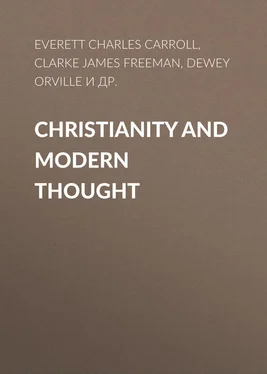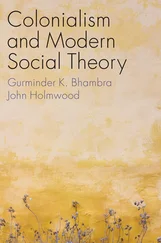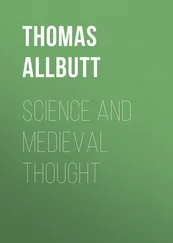Andrew Peabody - Christianity and Modern Thought
Здесь есть возможность читать онлайн «Andrew Peabody - Christianity and Modern Thought» — ознакомительный отрывок электронной книги совершенно бесплатно, а после прочтения отрывка купить полную версию. В некоторых случаях можно слушать аудио, скачать через торрент в формате fb2 и присутствует краткое содержание. Жанр: foreign_antique, foreign_prose, на английском языке. Описание произведения, (предисловие) а так же отзывы посетителей доступны на портале библиотеки ЛибКат.
- Название:Christianity and Modern Thought
- Автор:
- Жанр:
- Год:неизвестен
- ISBN:нет данных
- Рейтинг книги:5 / 5. Голосов: 1
-
Избранное:Добавить в избранное
- Отзывы:
-
Ваша оценка:
- 100
- 1
- 2
- 3
- 4
- 5
Christianity and Modern Thought: краткое содержание, описание и аннотация
Предлагаем к чтению аннотацию, описание, краткое содержание или предисловие (зависит от того, что написал сам автор книги «Christianity and Modern Thought»). Если вы не нашли необходимую информацию о книге — напишите в комментариях, мы постараемся отыскать её.
Christianity and Modern Thought — читать онлайн ознакомительный отрывок
Ниже представлен текст книги, разбитый по страницам. Система сохранения места последней прочитанной страницы, позволяет с удобством читать онлайн бесплатно книгу «Christianity and Modern Thought», без необходимости каждый раз заново искать на чём Вы остановились. Поставьте закладку, и сможете в любой момент перейти на страницу, на которой закончили чтение.
Интервал:
Закладка:
All this fruitful intellectual life must be traced directly back to the theological impulse given by Mohammed to the Arab mind; for it can be derived from no other source.
It is not quite so easy to define the precise influence on human progress given by the doctrines of the Reformation; for, before Luther, these were in the air. But no one can reasonably doubt that the demand for freedom of conscience and the right of private judgment in religion has led to liberty of thought, speech, action, in all other directions. To the war against papal and ecclesiastical authority in concerns of the soul we owe, how much no one can say, of civil freedom, popular sovereignty, the emancipation of man, the progress of the human mind. The theses of Luther were the source of the Declaration of Independence. And modern science, with the great names of Bacon and Newton, Descartes and Leibnitz, Goethe and Humboldt, is the legitimate child of Protestant Theology.
It is true that printing and maritime discoveries preceded Luther. But these inventions came from the same ideas which took form in the Lutheran Reformation. The discovery of printing was a result, no less than a cause. It came because it was wanted; because men were wishing to communicate their thoughts more freely and widely than could be done by writing. If it had been discovered five hundred years before, it would have fallen dead, a sterile invention, leading to nothing. And so the steam-engine and the railroad did not come before, because they were not wanted: as soon as they were wanted they came. That which lies at the root of all these inventions is the wish of man to communicate easily and rapidly and widely with his brother-man; in other words, the sense of human brotherhood. Material civilization, in all its parts and in all times, grows out of a spiritual root; and only faith leads to sight, only the things unseen and eternal create those which are seen and temporal.
The two Theologies at the present time which stand opposed to each other here are not Calvinism and Armenianism, not Trinitarianism and Unitarianism, not Naturalism and Supernaturalism. But they are the Theology of discouragement and fear on one side, that of courage and hope on the other. The one thinks men must be driven to God by terror: the other seeks to attract them by love. The one has no faith in man, believes him wholly evil, believes sin to be the essential part of him. The other believes reason a divine light in the soul, and encourages it to act freely; trusts in his conscience enlightened by truth, and appeals to it confidently; relies on his heart, and seeks to inspire it with generous affections and disinterested love. That this Theology of faith is to triumph over that of fear who can doubt? All the best thought, the deepest religion, the noblest aspiration of the age, flows in this direction. Whether our handful of Unitarian Churches is ever to become a great multitude or not, I do not know; but I am sure that the spirit which inspired the soul of Channing is to lead the future age, and make the churches which are to be. It is not now a question of Unity or Trinity, but something far deeper and much more important. While endeavoring to settle the logical terms of Christ's divinity and humanity, we have been led up higher to the sight of the Divine Father and the Human Brotherhood. Like Saul, the son of Kish, we went out to seek our father's asses, and have found a kingdom.
We have recently been told about a Boston Theology. If there is any thing which deserves to be called a Boston Theology it is this doctrine of courage and hope. For it is shared by all the leading minds of all Protestant denominations in this city. Whatever eminent man comes here, no matter what he was when he came, finds himself, ere long, moving in this direction. The shackles of tradition and formality fall from his limbs, his eyes open to a new light; and he also becomes the happy herald of a new and better day.
But a better word still, if one is wanted by which to localize these ideas, would be "The New England Theology." For in every part of New England, from the beginning; in every one of the multiform sects, whose little spires and baby-house churches have spotted our barren and rocky hills, there have never failed men of this true Apostolic succession; men believing in truth, and brave to utter it; believing that God loves truth better than falsehood; that he desires no one to tell a lie for his glory, or to speak words of wind in his behalf. With all our narrowness, our bigotry, our controversial bitterness, our persecuting zeal, – of which, God knows, we have had enough in New England, – the heart of New England has been always free, manly, and rational. Yes: all the way from Moses Stuart to William Ellery Channing, all along the road from the lecture-rooms on the hills of Andover to the tribune of Theodore Parker standing silent in the Music Hall, we have had this same brave element of a manly Theology. This has been the handful of salt which has saved New England. Hence it is that from the days of the early Puritans, men and women, of Harry Vane, Mrs. Hutchinson, and Roger Williams, who stood up for the rights of the human soul against priestly tyranny, down through the ministers of the Revolution who went with their people to the camp of Washington at Cambridge; down to the days of the Beechers, – there has never failed a man in the New England pulpit to stand up for justice, freedom, and humanity. From our bare hill-tops New England men and women have looked up to the sky and seen it not always nor wholly black with superstitious clouds, but its infinite depths of blue interpenetrated evermore with the warm living light of a God of Love. And therefore has New England been the fountain of Progress, the fruitful parent of Reforms, "the lovely mother of yet more lovely children."
I have quoted several striking passages from the Apostle Paul. One expresses his longing for greater excellence, and declares that he forgets every thing already attained, and is reaching out for better things, for more truth and more love. Another passage calls on his disciples to think for themselves, and be rational Christians, not children in understanding. A third asserts that he is the minister of the spirit of the gospel, not its letter; a fourth that his religion is not one of fear, but of power and love and a sound mind; a fifth says, Stand fast in freedom, and be liberal Christians; and in other places he exhorts his brethren not to be narrow, nor bigoted; but to look at every thing beautiful, lovely, true, and good, no matter where they find it. But a little while before he said these things Paul himself was one of the most narrow, and intolerant of men, opposed to progress wholly. What made this great change in his soul? It was that he had found a true Theology. He learned from Christ to trust simply in the divine love for pardon and salvation. He learned that God was the God of Heathen and Pagans as well as of Jews. He learned that no ritual, ceremony, sacraments nor forms, but only the sight of God as a Father and Friend, can really save the soul from its diseases, and fill it with immortal life. A true Theology was the secret of Paul's immense progress, and of his wonderful power to awaken and convert others. There are many who suppose his Theology obscure and severe. But when we penetrate the veil of Jewish language, we find it one of Freedom, of Reason, of Love, manly and tender, generous and intelligent. And this same Theology passing in its essence from Paul to Augustine, to Luther, to Wesley, has always been the motive power of human civilization and human development. It has been the friend of free thought, liberty of conscience, and universal progress.
I mean then by a true Theology what Paul meant when he said that God "has not given to us a spirit of fear, but of power, and of love, and of a sound mind." I mean what he said when he declared that God had made him a minister of the New Testament, not of the letter but of the spirit; for the letter killeth, but the spirit giveth life.
Читать дальшеИнтервал:
Закладка:
Похожие книги на «Christianity and Modern Thought»
Представляем Вашему вниманию похожие книги на «Christianity and Modern Thought» списком для выбора. Мы отобрали схожую по названию и смыслу литературу в надежде предоставить читателям больше вариантов отыскать новые, интересные, ещё непрочитанные произведения.
Обсуждение, отзывы о книге «Christianity and Modern Thought» и просто собственные мнения читателей. Оставьте ваши комментарии, напишите, что Вы думаете о произведении, его смысле или главных героях. Укажите что конкретно понравилось, а что нет, и почему Вы так считаете.












